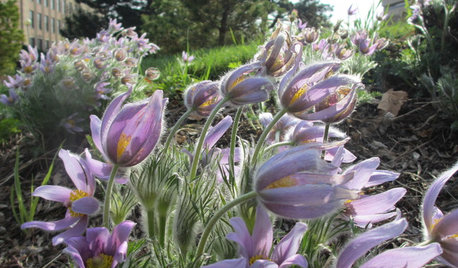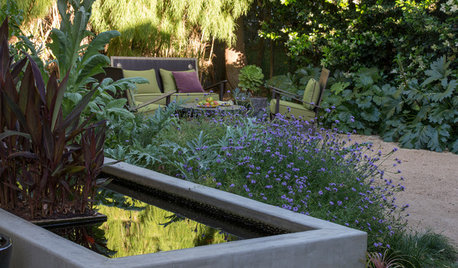Most people are aware of the handling-hazards of poison oak/ivy and nettles. Milkweed is not so well-known as an irritant; after all, it has the nice word "milk" in it and the white sap looks like milk.
When handling milkweed, take care to keep the white sap from broken milkweed pieces away from your eyes or other sensitive areas.
The following forum discussion includes member's experiences with milkweed, remedies, and preventative measures (Edited for brevity and subject flow).
Milkweed Toxins: Posted by flcajun fl 9 on Dec 5, 2006
Here in FL, we don't have any warning signs on the Milkweed about them being toxic for humans. Since my eyes were nearly ruined a couple of years ago when I got some in my eyes, I am eager to see something done here. Do any of you know if there is an institution responsible for requiring such notice by nursuries, etc.? My eye Dr. wants to have it established in our state if she can contact someone doing this.
Posted by flcajun fl 9 on Dec 6
This is how I contracted so much corneal trauma: I had been picking Milkweed leaves to feed my Monarch cats. I must have forgotten to wash my hands and put in my contact lenses. Several hours later, my eyes began to burn and get red. I was working in a wildlife refuge so had no way to take out my lenses until later. By then, my vision was blurring. Next morning I made an emergency appt. with my Dr., and she knew about Milkweed and eyes. When I told her I was with my butterflies before this happened, she made the connection. Treatment was finally sucessful though very expensive: salves and pills. She warns all her patients who tell her they have a butterfly hobby. Evidently this plant is known to cause corneal problems if hands are not washed thoroughly. I don't even touch my eyes outside now. Hope that helps ring the alarm.
Follow-Up Postings:
Posted by tdogmom z9/10 SoCal on Dec 7
I've had TWO mishaps with Milkweed latex/sap. P Both were obviously unintentional and I didn't even realize I'd had any on my skin. My poor ophthalmologist rolls HIS eyes when I call now, thinking, "It must be that ol' goofy butterfly plant again!" I am really careful about washing my hands and when I teach the children and teachers about butterfly science, I tell them about the 'poisons' associated with it. I also make sure that EVERYONE washes their hands after touching ANY of the plants since even RUE can cause allergic contact dermatitis.
With my eyes, I developed a fuzzy, blurred vision for over two weeks. My eye burned and was just a mess. Red, swollen (literally! Looked like one of those creatures on TV) and just odd overall...not something you'd wish on anyone. So, care is needed with Milkweed and probably just about any plant.
Posted by ericwi Dane County WI on Dec 9
I too, have managed to get small amounts of milkweed sap on my skin and in my eyes. In my experience, a long shower, taken as soon as possible after exposure, eliminates the adverse symptoms. Lots of warm water will wash away the irritant, and the symptoms do not return.
Posted by susanlynne48 z7a-OKC on Dec 7
I'm very cautious with my granddaughter helping me pick milkweed foliage for the cats, handling the cats, washing the milkweed, etc.
1. I make sure we don't gather milkweed until we are ready to go inside the house, so I don't have to worry about her getting it in her eyes accidentally or anything while playing outside. I reiterate to her that it's poisonous, she should put her hands or fingers up close to her face, mouth, or eyes.
2. We go inside and I immediately have her wash her hands.
3. I rinse the milkweed and dry it off, and she helps, and then we wash our hands again.
So, I do my best to be on top of it with her, but there is always room for an accident to occur.
We always wash our hands when we go inside after being outside as well. So, I've tried to impress upon her that we wash our hands frequently after playing outside. She's always asking me, "....is this plant poisonous, nannie?" Sometimes, I have to tell her I don't know, so I can look it up. But, we err on the side of caution, and I don't allow her to handle those that I am not sure about.
I also bought her some children's gardening gloves, which she loves. She has a little apron to put her plastic trowel, fork, etc., in while she's gardening with nannie.
Posted by elaineoz (My Page) on Dec 7
Thank you so much for posting this!! I had no idea that milkweed could be so toxic to the eyes. I have five small children, ages 8, 7, 5, and 3 year old twins. They are all fascinated by the butterflies. I will be very careful about this now. You know it would be very likely for small children to rub their eyes, and it would be so terribly awful if they got it in their eyes.
Posted by susanlynne48 z7a-OKC on Dec 5
I would think there would be an agency at the state level that governs the sale of plants and the application of warning labels to plants that are toxic.
States often rely on caveat emptor (buyer beware), and I research my plants so that I know what I'm planting. That wouldn't help, of course, if you were injured while browsing plant aisles at your local nursery.
If you run into nurserymen or stores that don't post a required toxic label, let them know. I doubt if my local grocery store would have a clue whether a plant should be labeled or not.
Posted by rhizo_1 7a AL on Dec 6
So sorry about your eyes, flcajun. I am afraid that I have to agree with the sentiment expressed by the others. A huge number of our every day garden and landscape plants have toxic properties and some are downright dangerous. But, if some agency decided that each of these had to be labeled, I'm afraid that our nurseries would look absolutely ridiculous. I've been to nurseries that took it upon themselves to offer educational handouts about various plant toxicities, but if each such plant were ordered to be labeled, then nurseries would be terribly burdened.
Posted by susanlynne48 z7a-OKC on Dec 6
As a gardener, I try to be aware of which plants are poisonous. However, I have had to learn thru my mistakes, too. I had a tuber of an alocasia that I was wintering over under flourescent lights in my kitchen. I didn't even think about it, but I knew it was poisonous. One of my cats ate part of the leaf and was very ill for a few days. He recovered nicely, but I learned that I cannot keep plants in the araceae family on the shelves in the kitchen anymore. I don't have any plants indoors anymore, because so many of them are poisonous to my cats. Cats being naturally curious may ignore them for a really long time, and then suddenly "munch", out of boredom or whatever, they decide to investigate.
The AMA does have the Handbook of Poisonous and Injurious Plants (Lampe, Kenneth F. and Mary Ann McCann) (1984).
Posted by naplesgardener Naples FL on Dec 9
I'd like to add my caution about another butterfly plant--passionflower (passiflora). I got a severe burn on my arm after moving and staking this plant used by gulf fritillary and zebras. It bubbled up with blisters and stayed "burnt" for many weeks leaving a scar that has faded now.
Posted by butterfly_pixie northern Ky. z6 on Dec 7
Wow, this discussion has really got my wheels turning....I'm going to post a special section on my website this weekend to warn about plant toxins. I've always been careful about those that I know about (Milkweed, Rue, etc.) but it never occured to me to make sure everyone that I teach butterfly gardening classes to are warned as well. I'll be sure to include this topic in all of my future presentations. Thank you flcajun for sharing with us...you may have just saved others from suffering as you did.
Posted by flcajun fl 9 on Dec 7
I am so very happy that my initial post may have saved others from this painful mishap: especially children who are now so involved with the Monarchs. Thanks to you all for participating in getting out the info.
Curated by: larry_gene













Related Discussions
Suburban chickens
Q
review of samsung washer dryer dv457evgsgr/wf457argswr
Q
Stone Information and Advice (& Checklists)
Q
New to the forum, and have a question
Q